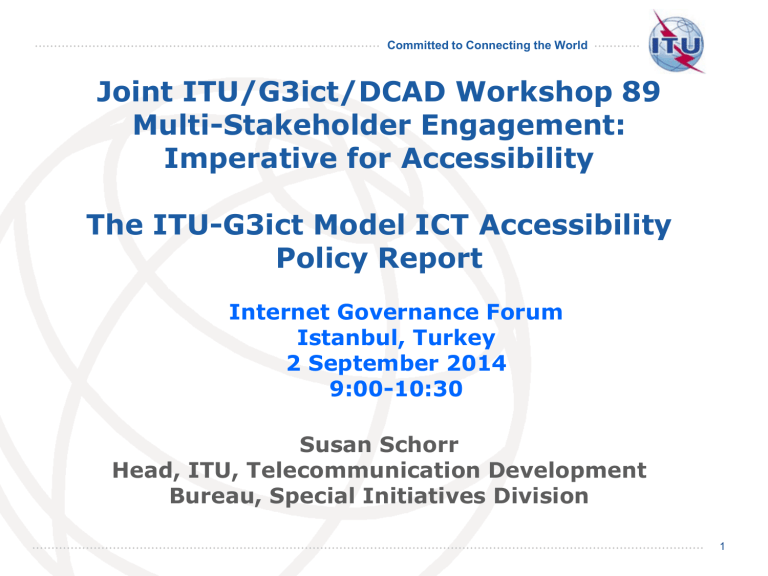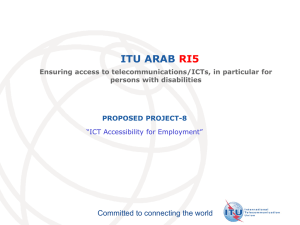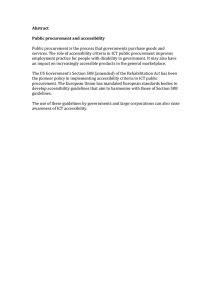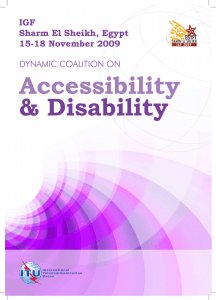Joint ITU/G3ict/DCAD Workshop 89 Multi-Stakeholder Engagement: Imperative for Accessibility

Committed to Connecting the World
Joint ITU/G3ict/DCAD Workshop 89
Multi-Stakeholder Engagement:
Imperative for Accessibility
The ITU-G3ict Model ICT Accessibility
Policy Report
Internet Governance Forum
Istanbul, Turkey
2 September 2014
9:00-10:30
Susan Schorr
Head, ITU, Telecommunication Development
Bureau, Special Initiatives Division
1
Committed to Connecting the World
Introduction
•
How to transpose CRPD into ICT Policy and Law?
•
Examples from ICT Accessibility Policy Modules
ICT Accessibility Legal, Policy and Regulatory Framework
Model ICT Accessibility Framework on Public Access
Model Mobile Communications Accessibility Policy Framework
Model Television/Video Programming Accessibility Policy Framework
Committed to Connecting the World
Transposing UNCRDP into ICT Policy and Law
States Parties have ICT policies, legislation and regulations
These key legal instruments must be updated to achieve the goal of promoting ICT accessibility
States Parties Disability laws also have to be updated to promote
ICT accessibility
Updating States Parties Public Procurement laws may be one of the most effective ways to ensure the availability of accessible ICTs
Overview of Modules
Committed to Connecting the World
Module 1 Legal, Policy, Regulatory –
Framework
o Options for regulation
• License Conditions/ Authorizations
• Regulations
• Voluntary Measures – self/co -regulation o Universal access and service (“UAS”) framework
Current frameworks focus on two key goals: availability of ICT networks and affordability of ICT services
Need to add a third goal – ICT accessibility
Overview of Modules
Committed to Connecting the World
Legal, Policy, Regulatory - Context
o Definitions – Review of definitions in existing ICT/electronic communications law
• Add a definition of “persons with disabilities” in basic ICT law
• Revise “ICT users” definition to includes PwD
• Revise “underserved communities” definition to include PwD
• Expand “universal access” and “universal service” definitions to also include ICT accessibility for persons with disabilities o Public consultation with persons with disabilities and other stakeholders o Consumer protection o Emergency services o Reporting requirements o Changes to disability legislation/ disability rights law
Committed to Connecting the World
Overview of Modules
Mobile Phone Accessibility
Availability
provide customers a range of accessible products, services and devices meeting the requirements of various types of disabilities
Practical Tools:
Affordability
offer special and/or discounted rates and plans for users with disabilities – i.e. text only plans for the deaf
Model Mobile
Accessibility Policy
Model Code of Conduct
(for mobile industry)
Awareness
train staff on accessible products and services and serving customers with disabilities
Emergency Communications
ensure PwD can communicate by text & video relay and call centres are made aware caller has a disability
Model Regulations
(for regulators)
Overview of Modules
Committed to Connecting the World
TV / Video Programming
o Broadcasters to deliver closed captioning, audio description, audio subtitles and signing o Content creators are responsible for creating the content for these services and delivering the content along with the programming to the licensed service provider o Sets targets for type of broadcasts to be made accessible and establish quality of service standards for access services o Calls for awareness raising to users are aware that accessible broadcasting services exist o Electronic Programming Guide (EPG) – e.g. symbols to denote accessibility – closed captions (CC, signing (SL) and audio description (AD).
Overview of Modules
Committed to Connecting the World
P ICT Accessibility Framework on Public Access
Hardware
• Accessible payphones and telecentres for persons with sensory and physical impairments
• Large-print and/or Braille signage
• Alternate mice and/or keyboard (e.g., a trackball, joystick, mini-keyboard, one-handed keyboard)?
Software and websites
• Screen readers
• Website for telecentre adheres to accessibility guidelines or standar ds
Inclusion
• Persons with disabilities are included in planning and evaluating public access facility products and services
Staff training
• Staff members are familiar with the availability and use of accessible ICT features, assistive technology and alternate document formats, receive training on serving persons with disabilities and on use of ICTs by persons with disabilities
Committed to Connecting the World
Conclusion
o Important to use appropriate legal, regulatory and policy tools to implement ICT Accessibility commitments and intentions o Collaboration between all stakeholders must be encouraged o Consultation is key to ensuring practical and relevant implementation o On-going reporting and review is an important component of effective policy
:
Thank you for your attention!
susan.schorr@itu.int
For more information:
http://www.itu.int/en/ITU-D/Digital-Inclusion/Persons-with-
Disabilities/Pages/Persons-with-Disabilities.aspx
10



